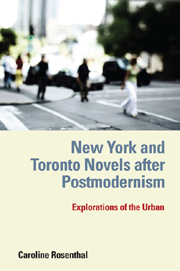Book contents
- Frontmatter
- Contents
- Preface and Acknowledgments
- Introduction
- 1 Imagining National Space: Symbolic Landscapes and National Canons
- 2 Articulating Urban Space: Spatial Politics and Difference
- 3 “The Inadequacy of Symbolic Surfaces”: Urban Space, Art, and Corporeality in Siri Hustvedt's What I Loved
- 4 Rewriting the Melting Pot: Paule Marshall's Brownstone City in The Fisher King
- 5 Specular Images: Sub/Urban Spaces and “Echoes of Art” in Carol Shields's Unless
- 6 “The End of Traceable Beginnings”: Poetics of Urban Longing and Belonging in Dionne Brand's What We All Long For
- 7 Synthesis
- Bibliography
- Index
7 - Synthesis
Published online by Cambridge University Press: 12 September 2012
- Frontmatter
- Contents
- Preface and Acknowledgments
- Introduction
- 1 Imagining National Space: Symbolic Landscapes and National Canons
- 2 Articulating Urban Space: Spatial Politics and Difference
- 3 “The Inadequacy of Symbolic Surfaces”: Urban Space, Art, and Corporeality in Siri Hustvedt's What I Loved
- 4 Rewriting the Melting Pot: Paule Marshall's Brownstone City in The Fisher King
- 5 Specular Images: Sub/Urban Spaces and “Echoes of Art” in Carol Shields's Unless
- 6 “The End of Traceable Beginnings”: Poetics of Urban Longing and Belonging in Dionne Brand's What We All Long For
- 7 Synthesis
- Bibliography
- Index
Summary
Where there is space, there is being.
— Henri Lefèvbre, The Production of SpaceConcrete Abstractions
In a recent article Toronto-based geographer Amy Lavender Harris wrote, “Few of us can say we were born in this city, but we give birth to it every day.” Her statement vividly captures how urban space is not only defined by buildings and street grids but is produced in the daily interactions of people, in how they use urban space and make it come alive, and in the symbolic practices that imagine the city anew time and again. A city, to paraphrase the Canadian cultural geographer Rob Shields once more, is a “concrete abstraction” (“A Guide,” 231), which arises on the crossroads of dream and reality, idea and materiality, fiction and fact. Fictions about cities not only represent a material city but contribute to making and changing the specific syntax and semantics inherent to that city — and to the nation, whose values and cultural orders that city epitomizes in a myriad of different forms. As much as the four novels I analyzed differ in content and style, they show striking parallels in how they thematically and aesthetically deal with the urban. A corpus of four texts is hardly large enough to discern general tendencies in contemporary urban fiction, and as the urban and its representation has diversified into numerous different perspectives and ceased to be a synecdoche for human existence in general, it would not be advisable to draw such general conclusions, either.
- Type
- Chapter
- Information
- New York and Toronto Novels after PostmodernismExplorations of the Urban, pp. 264 - 278Publisher: Boydell & BrewerPrint publication year: 2011

